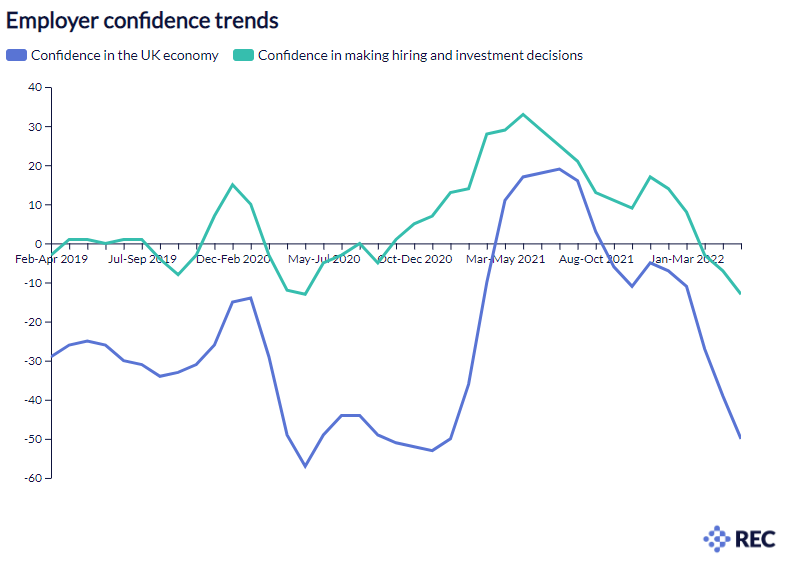That’s according to new data from the Recruitment and Employment Confederation (REC).
In April-June 2022, employer confidence in making hiring and investment decisions for their own business hit a net: -13. This is the same level as April-June 2020, at the height of the pandemic. Meanwhile, business confidence in the economy fell by 40 percentage points from January-March 2022 to net: -50.
Despite this, labour shortages mean that many firms are still trying to hire new staff. The hiring outlook stayed positive, although it slowed slightly from the first quarter of this year. In the short term, hiring intentions for permanent staff decreased by 5 percentage points to net: +23, while demand for temporary workers fell by 4 points to net: +12.
Neil Carberry, Chief Executive of the REC, said:
“This new report clearly shows the effect of rising inflation and labour shortages on businesses across the country. The economy has slowed significantly from the post-lockdown bounce and the next few months look much tougher. While firms are still looking to bring on new staff, this is really a reflection of how difficult businesses have found it to hire so far this year. All of this only emphasises the importance of companies working with professional recruiters on their plans – and for government to take action so we aren’t choking off the growth we need.”
“Part of the solution will be more inclusive recruitment processes, so it’s encouraging to see a fifth of companies pushing in that direction. But it also means investing in training and developing staff, and ensuring working conditions and benefits are competitive enough to help attract and retain talented people.”
Other stats from the latest JobsOutlook include:
- In the medium term (the next 4-12 months), hiring intentions for permanent staff and temporary agency workers both declined by 2 percentage points from the previous quarter, to net: +25 and net: +13, respectively.
- In April and June, when asked about four recruitment policies1 designed to improve equality, diversity and inclusion (EDI), almost one in five employers (18%) had not implemented any of them as part of their hiring process. Encouragingly, 18% were planning on introducing at least one of these policies in the future.
Another recent report from the REC found that if labour shortages continue, a spike in demand in the economy could cost the UK up to £39 billion of lost growth every year, equivalent to almost the entire defence budget. This would also lower wage growth and reduce tax income, as well as causing lower profits. In Overcoming shortages: How to create a more sustainable labour market, the REC set out a number of recommendations for business and government, including prioritising long-term workforce planning at the highest level.







